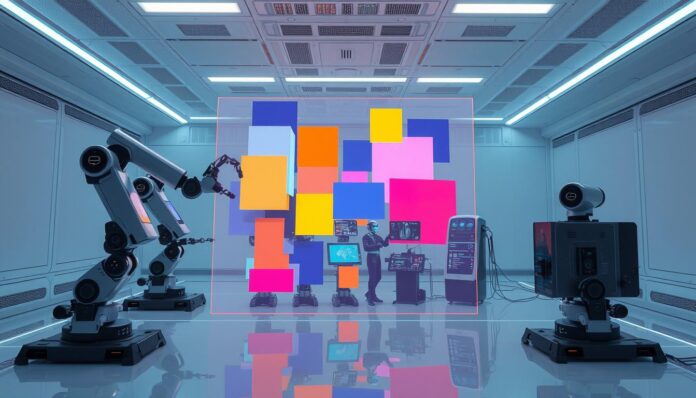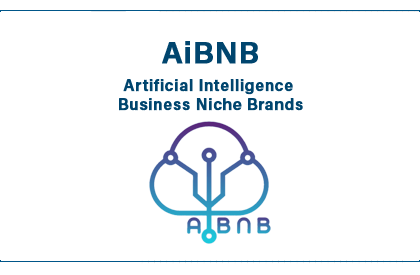Andrew Ng, a top AI expert, once said, “AI is the new electricity.” This quote highlights the big impact artificial intelligence is making. Expect to see a lot of ai news, as artificial intelligence trends and machine learning advancements change how businesses work. In 2025, AI agents and teammates will become more common, making things better and more creative in business.
More companies will use AI, bringing both chances and challenges. You’ll see big improvements in quality, accuracy, and automation. AI news and trends will lead the way. As you explore machine learning advancements, you’ll see how AI is changing industries like healthcare and finance. It’s opening up new chances for growth and innovation.
The Current State of AI Innovation in 2025
Exploring AI innovation today, you’ll see big steps forward in machine learning and deep learning. OpenAI and DeepMind lead these advances. OpenAI’s Operator, for example, can automatically navigate websites and do tasks for us. This makes web automation more efficient and cuts down on human work.
Agentic AI is gaining ground, with 37% of U.S. IT leaders already using it. Another 68% plan to invest in it soon. AI can cut human effort by up to 70% and hosting costs by 20-50%. It’s also improving customer experiences in areas like ads and cars.

The rules around AI are changing too. As AI gets better, we need to handle its challenges and benefits. There are over 300 examples of AI in real life, showing it’s always getting better and cheaper. OpenAI, DeepMind, and AI rules will shape AI’s future.
Breakthrough Developments in Generative AI
Generative AI is changing many fields, like healthcare and finance. It uses large language models to look at medical images and find diseases. In finance, it spots fake transactions and guesses market trends, making things safer.
The latest in generative AI has made finding new materials faster. For example, models like MatterGen can cut down the time needed to find new materials. This used to take years, looking through millions of options.
Mayo Clinic and Microsoft Research are working together. They want to use generative AI to make radiology better, starting with X-rays. This aims to make medical care faster and more accurate, showing how important ai security is in healthcare.
As generative AI grows, it will make designing materials better in many fields. This includes electronics, energy storage, and biomedical engineering. Generative AI is set to be a key player in the future of tech and innovation, using large language models and ai security to help grow and improve.
Machine Learning Evolution and Deep Learning Advances
Exploring artificial intelligence today means looking at machine learning and deep learning’s growth. These technologies have greatly changed how businesses work. They’re used in healthcare, finance, and entertainment.
In healthcare, ai can predict patient outcomes and tailor treatments. In finance, it spots fraud and forecasts market trends. This shows how ai chips have boosted these fields.
These chips speed up complex algorithms. This lets businesses analyze big data and refine models. So, ai in finance can now better manage investments and predict stock prices. In healthcare, it aids in creating personalized medicine and improving patient care.
Machine learning and deep learning have made ai systems more advanced. These systems learn from data and get better over time. This helps businesses make smarter choices and grow.
With ongoing improvements in ai chips and algorithms, we’ll see more ai uses in healthcare, finance, and other areas. This is exciting for the future of these industries.
AI Innovations Transforming Healthcare and Medicine
Exploring the latest in healthcare shows how nvidia ai and amd ai are changing medical diagnosis and treatment. Ai startups are also key in creating new solutions. For example, AI can look through huge amounts of medical images. It finds patterns and details that humans might miss.
AI in healthcare is set to change the game, with big improvements in the next 5-10 years. Algorithms will need less data to learn and can use unlabelled data. This means more accurate diagnoses and treatments tailored to each patient. Ai startups, working with big names like OpenAI and DeepMind, are leading these changes.
AI has many uses in medicine, from looking at genetic profiles and tumor mutations to finding the right treatments for cancer. It also helps in making treatment plans for long-term conditions better. Thanks to nvidia ai and amd ai, finding new medicines is faster and cheaper. This makes the future of healthcare look bright, with AI making big changes and better patient care.
Financial Sector Revolution Through AI
The financial sector is changing fast thanks to AI. Deep learning and automation are making customer service better and operations smoother. For example, AI helps make quicker and smarter decisions in following rules.
AI in fraud detection spots new patterns that old systems miss. This cuts down on false alarms. Also, AI helps give customers personalized advice and support. Banks use AI to offer services like facial recognition and voice commands, making interactions better.
AI is also improving predictions for revenue and stock prices. This means better models and less need for humans. The market for AI in finance is set to hit $22.6 billion by 2025, growing fast. AI is becoming key in the financial world’s future.
Entertainment Industry’s AI Transformation
The entertainment world is changing fast with AI. It’s all about making content more personal and improving how we experience it. Netflix and Spotify use AI to give us shows and songs we’ll love.
AI is also helping in making and sharing movies and TV shows. Big names like Warner Bros. and Sony Pictures are using AI to guess how well their movies will do. AI is even making editing faster, cutting down production time by up to 70%.
AI is set to make a big splash in the entertainment world. By 2025, 80% of leaders think AI will change how we make and market content. The market for AI in media and entertainment is expected to hit $2.5 billion by 2025. AI is making content more personal and helping companies understand their audiences better.
Regulatory Landscape and Ethical Considerations
Understanding the world of AI is key. Recent changes in ai policy have reshaped how businesses work. The European Union’s Artificial Intelligence Act (AIA) now has strict rules, with fines up to €35 million for breaking them. The AIA also classifies AI systems by risk, with tough rules for high-risk areas like synthetic media.
In the United States, the National Institute of Standards and Technology (NIST) has set guidelines for trustworthy AI. Many places are looking to update laws to handle AI better. They’re also creating algorithmic impact assessments (AIAs) to check AI’s social and ethical effects before it’s used.
Regulatory sandboxes are being set up to let developers test AI safely. This ensures ai governance works well and efficiently.
The Organisation for Economic Co-operation and Development (OECD) has set AI principles. These focus on fairness, sustainability, and responsibility. The Global Partnership on Artificial Intelligence (GPAI) works with governments, schools, and businesses to tackle ethical and social issues. Keeping up with ai policy changes and governance is vital for your business. This way, you can handle the changing landscape of synthetic media and AI.
Corporate AI Integration and Market Impact
Thinking about the future of AI? It’s key to see how AI changes how companies work. A Deloitte report shows 58% of employees see AI as a big plus for innovation. AI makes businesses run smoother, helping them make better choices and guess market trends.
AI’s role in business is huge, with 74% of energy and utility firms using it, IBM reports. AI analytics speed up decision-making by 20%. Also, companies that use AI well to personalize services can earn 40% more than others, McKinsey found.
The AI market for business use is set to hit $190 billion by 2025. Companies using AI in supply chains can cut costs by 15%, improve inventory by 35%, and boost service by 65%, McKinsey says. As you look ahead, grasp how AI can boost your business’s growth and innovation.
Conclusion – The Future Trajectory of AI Innovation
The AI revolution is moving fast, with big promises for the future. More than half of companies are already using AI in some way. This trend will grow, bringing new changes to fields like healthcare, finance, media, and manufacturing.
As AI grows, so does the need for rules to protect privacy and ethics. Companies must be quick to adapt to these changes. AI will change jobs, affecting nearly half of workers’ skills. But, by using AI wisely, businesses can become more efficient and competitive.




